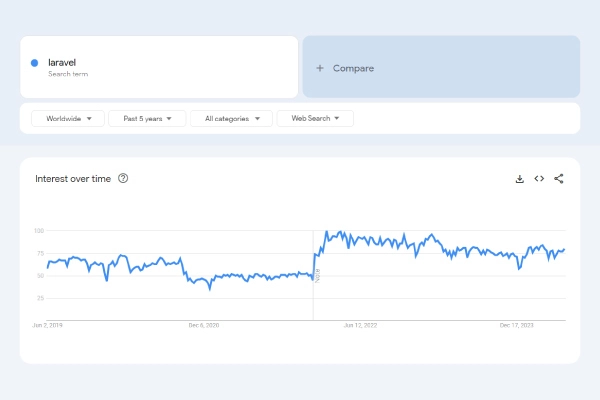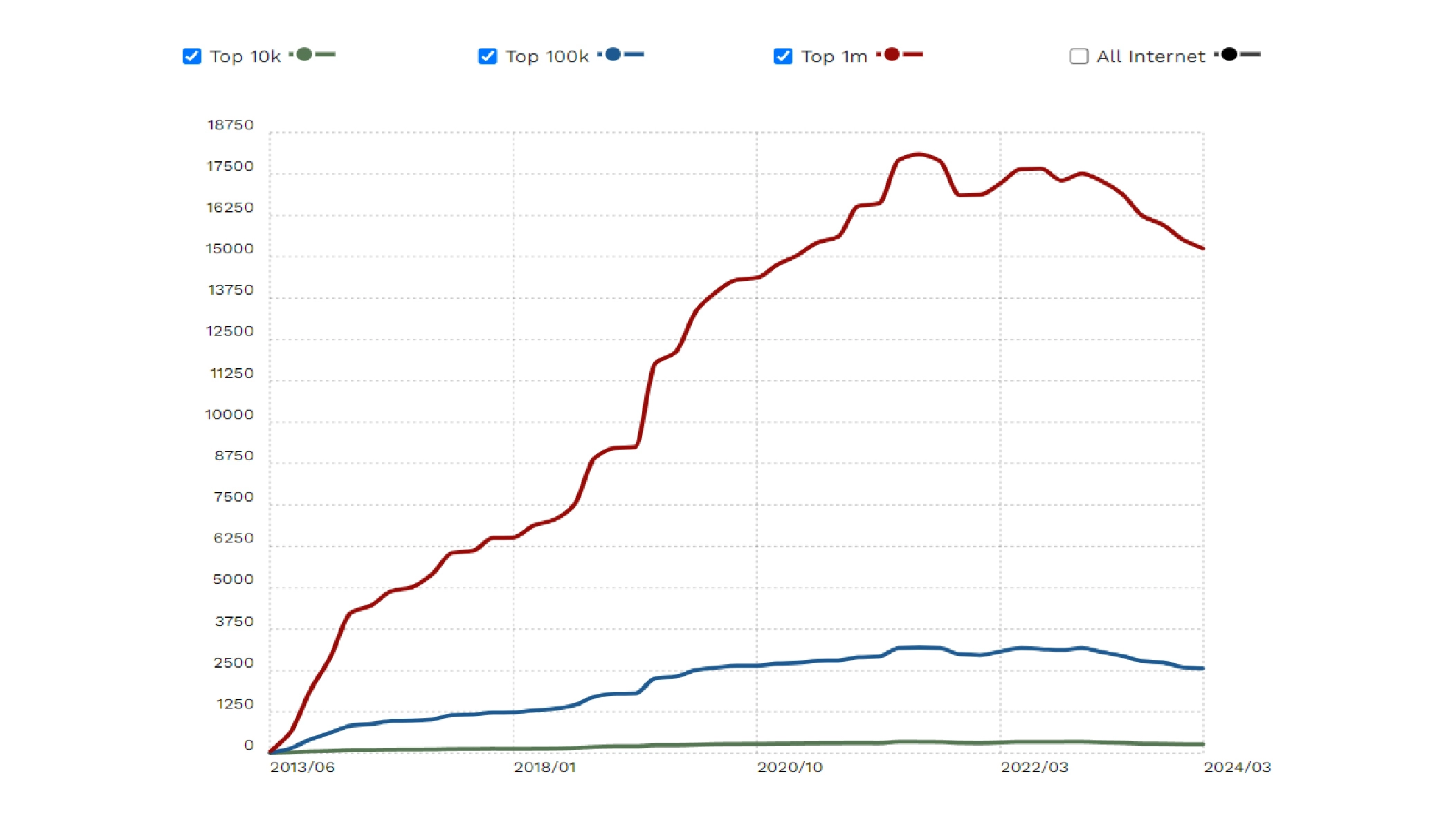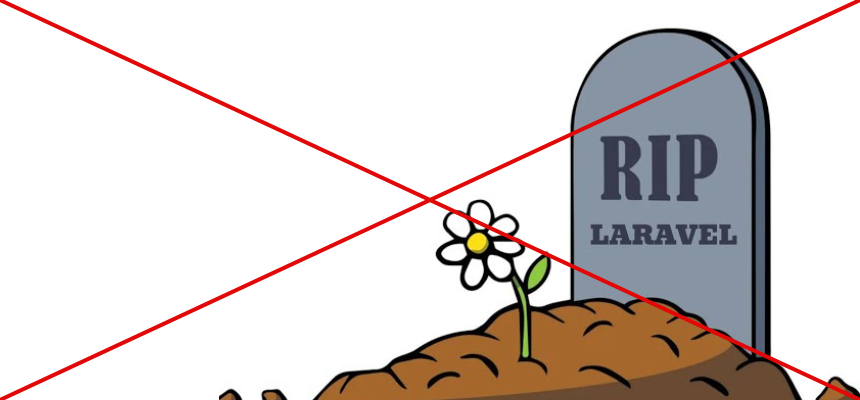Are you serious? Is Laravel outdated? Why are we still using Laravel? Continue reading to find out the answer.
I am a marketing officer at Sanmark Solutions, a software development company that provides software solutions worldwide. Recently, I came across a video claiming that Laravel is outdated. I was curious to understand why someone would think this, given that our company, Sanmark, has over 11 years of experience using Laravel. Many companies hire Laravel developers from us and continue to use it successfully. We have completed numerous Laravel web development projects using this framework. However, keep reading to see what I discovered.
According to recent analysis, there are 956,924 websites currently using Laravel. Additionally, Google Trends shows that the term “Laravel” is more popular now than it was in the past few years.

Laravel is a powerful PHP framework designed for web application development. It offers elegant syntax, rich features, and a strong focus on developer experience. Since its initial release in 2011, Laravel has become one of the most popular frameworks for building robust, scalable, and maintainable web applications.
The Debate About Whether Laravel is Outdated:
There is an ongoing debate about whether Laravel is outdated. Some developers, like David Connelly, argue that Laravel is in decline. He has highlighted several reasons for his perspective, which we will explore in this article. These arguments continue to spark discussions within the developer community. We will also examine the rebuttals to these claims to provide a balanced view.
You can watch this video on why David Connelly argues that Laravel is outdated. Watch the original video on YouTube
Reasons Cited for Laravel Being Outdated
Reason 1: Worst in-class Benchmarks
Claim: Laravel has poor performance benchmarks.
David’s Argument:
- Laravel is slow, bloated, and over-engineered.
- Benchmark tests show Laravel consistently underperforming compared to other frameworks like Trongate.
- He argues that Laravel’s excuses for these poor benchmarks are not valid.
Rebuttal:
- Benchmarks Context: Benchmark results can vary depending on the setup. While Laravel may seem slower in some tests, these often involve fully loaded applications that use all of Laravel’s features.
- Optimization: A well-optimized Laravel application can still perform well. Performance isn’t just about the framework but also how you use it.
Reason 2: Zero Stability
Claim: Laravel lacks stability due to frequent updates.
David’s Argument:
- Laravel’s frequent updates (previously every 6 months, now every 12 months) lead to breaking changes.
- These changes make it difficult to maintain applications and are often disguised as necessary security patches, which he calls the “Laravel Deception.
- He believes this practice is unethical and disruptive for both clients and developers.
Rebuttal:
- Update Cycle: While frequent updates can be challenging, Laravel provides extensive documentation and guides to help developers manage these changes.
- Security: Regular updates ensure that applications are secure and up-to-date with the latest features and improvements.
Reason 3: Zero Innovation
Claim: Laravel lacks unique features that set it apart.
David’s Argument:
- Laravel does not have any groundbreaking features. It has many good features, but nothing unique.
- He believes this lack of innovation makes Laravel less appealing to developers looking for cutting-edge solutions.
Rebuttal:
- Feature Rich: Laravel may not have unique features, but it offers a comprehensive set of tools that make development easier and more efficient.
- Focus: Laravel’s strength lies in its robust ecosystem and focus on developer experience rather than constantly introducing new, untested features.
The performance of Laravel from a developer’s and a user’s point of view.
Chethana Kalpage is a Laravel developer at Sanmark Solution with four years of experience in this field.
I am a Laravel developer at Sanmark Solutions with four years of experience using Laravel. From my viewpoint, I can’t totally agree with Mr. Connelly’s opinion. Here’s what I have observed from my experience with Laravel.
Working with Laravel over the past four years has been rewarding. The framework’s elegant syntax and robust features make development enjoyable and efficient.
In my experience, the strengths of Laravel far outweigh its drawbacks. While Mr. Connelly raises some valid points about performance and frequent updates, I believe that with proper optimization and a good understanding of the framework, Laravel remains a top choice for web development. Our projects at Sanmark Solutions have consistently benefited from Laravel’s features and community support, making it a reliable and powerful framework for our needs.
Mr. Connelly argues that Laravel isn’t liked by developers, citing poor performance benchmarks and claiming Laravel is slow and bloated. While benchmarks can show Laravel underperforming compared to lighter frameworks, these often involve fully loaded applications. With Laravel 11, the architecture has been simplified, and for simple API development, Lumen is a viable alternative.
Regarding stability, Mr. Connelly criticizes Laravel’s frequent updates, suggesting they lead to instability. However, these updates, now every 12 months, bring new features and improvements, ensuring the framework supports the latest PHP features. Despite frequent updates, Laravel maintains backward compatibility, with Laravel 5 codebases still running without issues.
Contrary to claims of no innovation, Laravel’s regular updates mean new features are consistently added. The framework’s robust ecosystem and focus on developer experience make it a powerful tool for web development.
See what our CEO’s opinion is: Is Laravel outdated or not?
As the CEO of Sanmark Solutions, I’ve spent the last 11 years working with Laravel. When I first discovered Laravel, I was immediately impressed by its reliability and effectiveness. Over the years, I’ve seen many frameworks come and go, but Laravel has always stood strong.
In my experience, Laravel is the best framework available today. Its regular updates keep it modern and efficient, so I see no need to switch to another framework. For small- and medium-scale businesses, it’s the perfect choice.
New frameworks may appear, but Laravel’s long-term reliability means it’s still the safest and most powerful option. In my view, Laravel remains the top choice for web application development.
Current State of Laravel
Recent Updates and Versions of Laravel
Laravel is known for its regular updates and commitment to keeping the framework modern and efficient. As of May 2024, the latest version is Laravel 11.x. These updates occur every six months, bringing new features, security patches, and performance improvements. This consistent update cycle ensures that Laravel remains aligned with the latest trends in web development.
Current Usage Statistics and Community Support for Laravel
The usage statistics of Laravel highlight its widespread adoption and robust community support. According to the provided graph, Laravel has seen significant growth over the years:
The BuiltWith graph on Laravel usage statistics.

- Top 10k Websites: Laravel’s presence in the top 10,000 websites shows a steady increase, demonstrating its reliability for high-traffic sites.
- Top 100k Websites: The framework has a consistent upward trend in the top 100,000 websites, indicating its popularity among medium to large-scale applications.
- Top 1m Websites: Laravel’s usage in the top 1 million websites peaked around early 2021 and has maintained a high level since then, proving its continued relevance and trust among developers.
Laravel’s large and active community plays a crucial role in its success. Developers worldwide contribute to the framework by creating packages, providing support, and sharing their knowledge. This strong community ensures that Laravel continues to evolve, with plenty of resources available for learning and problem-solving.
Conclusion
Despite the ongoing debate about whether Laravel is outdated, our experience at Sanmark Solutions shows that it remains a powerful and reliable framework for web development. With its elegant syntax, robust features, and strong community support, Laravel continues to be an excellent choice for developers and businesses alike. Regular updates ensure it stays current, and its comprehensive ecosystem provides everything needed for successful web applications. While some criticisms are valid, the benefits of Laravel far outweigh its drawbacks, making it a top contender in the world of web development.
Do you want to learn more about Laravel? Check out this article for insights into Laravel.

Leave A Comment